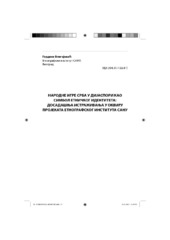Приказ основних података о документу
Народне игре Срба у дијаспори као симбол етничког идентитета: досадашња истраживања у оквиру пројеката Етнографског института САНУ
The Folk Dances of Serbs in Diaspora as a Symbol of Ethnic Identity: Current Research Within the Projects of the Institute of Ethnography of the Serbian Academy of Arts and Sciences
| dc.contributor | Благојевић, Гордана | |
| dc.contributor | Тодоровић, Ивица | |
| dc.creator | Благојевић, Гордана | |
| dc.date.accessioned | 2020-04-11T18:29:53Z | |
| dc.date.available | 2020-04-11T18:29:53Z | |
| dc.date.issued | 2010 | |
| dc.identifier.isbn | 978-86-86805-36-2 | |
| dc.identifier.uri | https://dais.sanu.ac.rs/123456789/7798 | |
| dc.description.abstract | У раду се посматрају народне игре као симбол етничког идентитета на примеру Срба у дијаспори. У оквиру пројеката Етнографског института САНУ дуги низ година се спроводе истраживања Срба ван Србије. Народне игре се помињу у оквиру проучавања Ср ба у Мађарској, Канади, Чикагу (САД) и Калифорнији (САД). Разматра се различит однос према народним играма у матици и у дијаспори. Заједничка песма и игра пред стављају део духовне, националне, културне и музичке идентификације којом наши исељеници остварују везу са домо вином. Посматра се које се игре највише играју, као и ношње које се за те прилике користе. Емигрантска култура није никада истоветна оној у постојбини и увек постоје инвентивна прилагођавања узастопних таласа емиграната. | sr |
| dc.description.abstract | The paper considers folk dances as a symbol of ethnic identity on the example of the Serbs in the Diaspora. Within the project of the Institute of Ethnography of the Serbian Academy of Sciences and Arts, for many years are conducted researches about Serbs outside Serbia. Folk dances are mentioned within researches of Serbs in Hungary, Canada, Chicago (USA) and California (USA). Here is elaborated the different approach to the folk dances both, in the country of origin, and in the Diaspora. Mutual songs and dances represent a part of spiritual, national, cultural and music identifications by which our emigrants keep the contact with their country of origin. The paper also pays attention to the dances which are performed the most and to the costumes used in those events. The emigrant culture is never equal to one in the country of origin, and there are always some inventive adaptations by successive waves of emigrants. | en |
| dc.language.iso | sr | sr |
| dc.publisher | Сремски Карловци : Академија Српске Православне Цркве за уметности и консервацију | sr |
| dc.relation | info:eu-repo/grantAgreement/MESTD/MPN2006-2010/147023/RS// | sr |
| dc.rights | openAccess | sr |
| dc.rights.uri | https://creativecommons.org/licenses/by-nc-nd/4.0/ | |
| dc.source | Традиција – фолклор – идентитет : тематски зборник / Tradition – Folklore – Identity : Thematic Journal | sr |
| dc.subject | етнички идентитет | sr |
| dc.subject | народне игре | sr |
| dc.subject | Срби | sr |
| dc.subject | дијаспора | sr |
| dc.subject | ethnic identity | sr |
| dc.subject | traditional folk dances | sr |
| dc.subject | Serbs | sr |
| dc.subject | diaspora | sr |
| dc.title | Народне игре Срба у дијаспори као симбол етничког идентитета: досадашња истраживања у оквиру пројеката Етнографског института САНУ | sr |
| dc.title | The Folk Dances of Serbs in Diaspora as a Symbol of Ethnic Identity: Current Research Within the Projects of the Institute of Ethnography of the Serbian Academy of Arts and Sciences | en |
| dc.type | bookPart | sr |
| dc.rights.license | BY-NC-ND | sr |
| dcterms.abstract | Blagojević, Gordana; Narodne igre Srba u dijaspori kao simbol etničkog identiteta: dosadašnja istraživanja u okviru projekata Etnografskog instituta SANU; | |
| dc.citation.spage | 29 | |
| dc.citation.epage | 40 | |
| dc.description.other | Коуредник Александра Мирковић | sr |
| dc.type.version | publishedVersion | sr |
| dc.identifier.fulltext | https://dais.sanu.ac.rs/bitstream/id/30422/bitstream_30422.pdf | |
| dc.identifier.rcub | https://hdl.handle.net/21.15107/rcub_dais_7798 |

